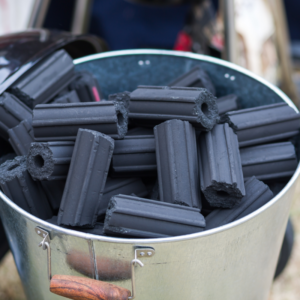
When it comes to choosing charcoal for various purposes, such as grilling, barbecuing, or other uses, the decision between coconut charcoal and wood charcoal can be a tough one. Both types of charcoal have their advantages and disadvantages, and understanding the key differences can help you make an informed decision. Let’s explore the pros and cons of coconut charcoal and wood charcoal to help you determine which one is the better choice for your needs.
Coconut Charcoal
Coconut charcoal is made from the shells of mature coconuts, which are a byproduct of the coconut industry. Here are some of the advantages of using coconut charcoal:
High-Quality Charcoal: Coconut charcoal is known for its high-quality properties, such as high carbon content, low moisture content, and dense structure. This results in a longer burning time, consistent heat, and minimal smoke and emissions.
Sustainability: Coconut shells are a renewable and sustainable source of biomass, as they are a byproduct of the coconut industry. Using coconut shells for charcoal production reduces waste and promotes a circular economy, making it an environmentally friendly choice.
Eco-Friendly Production Process: The production process of coconut charcoal typically involves less deforestation and fewer harmful chemicals compared to other methods of charcoal production. This makes coconut charcoal a more environmentally friendly option.
Versatility: Coconut charcoal is highly versatile and finds application in various industries and households, such as grilling, barbecuing, water and air purification, cosmetics, pharmaceuticals, and more.
However, there are some potential disadvantages of using coconut charcoal, such as:
Cost: Coconut charcoal can be more expensive compared to wood charcoal due to the additional processing and production involved.
Availability: Coconut shells may not be as readily available as wood for charcoal production in some regions, which can impact the availability and cost of coconut charcoal.
Wood Charcoal
Wood charcoal is made from various types of wood, such as hardwood or softwood, and is a common choice for charcoal production. Here are some advantages of using wood charcoal:
Cost: Wood charcoal is generally more affordable compared to coconut charcoal, as wood is widely available in many regions.
Traditional Flavor: Wood charcoal imparts a traditional smoky flavor to food, which some people prefer in their grilling or barbecuing.
Availability: Wood is abundant in many regions, making wood charcoal readily available in the market.
However, there are some potential disadvantages of using wood charcoal, such as:
Quality: The quality of wood charcoal can vary depending on the type of wood used, the production process, and moisture content. Lower quality wood charcoal may result in inconsistent heat, shorter burning time, and more emissions.
Environmental Impact: The production of wood charcoal can contribute to deforestation and environmental degradation, especially if not sourced sustainably. This can have negative impacts on biodiversity, climate change, and local communities.
Conclusion
In conclusion, both coconut charcoal and wood charcoal have their advantages and disadvantages. Coconut charcoal is known for its high-quality properties, sustainability, and eco-friendly production process, but it may be more expensive and less readily available in some regions. On the other hand, wood charcoal may be more affordable and offer a traditional flavor, but the quality and environmental impact can vary. Ultimately, the choice between coconut charcoal and wood charcoal depends on your specific needs, preferences, and environmental considerations. If sustainability and high-quality charcoal are important to you, coconut charcoal may be the better choice. However, if affordability and traditional flavor are your priorities, wood charcoal may be a suitable option. Regardless of your choice, it’s essential to use charcoal responsibly, following proper usage and disposal practices to minimize environmental impact.

